On July 22, 2025, the European police agency Europol said a long-running investigation led by the French Police resulted in the arrest of a 38-year-old administrator of XSS, a Russian-language cybercrime forum with more than 50,000 members. The action has triggered an ongoing frenzy of speculation and panic among XSS denizens about the identity of the unnamed suspect, but the consensus is that he is a pivotal figure in the crime forum scene who goes by the hacker handle “Toha.” Here’s a deep dive on what’s knowable about Toha, and a short stab at who got nabbed.
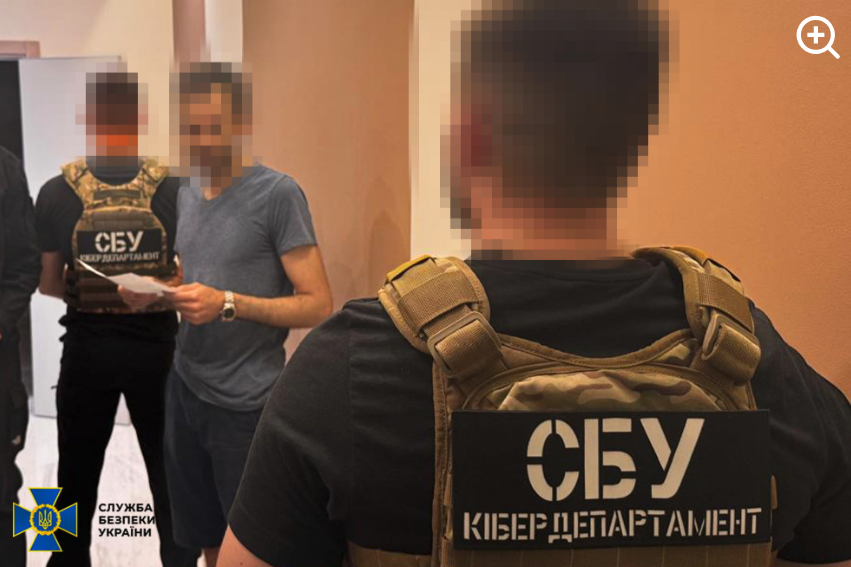
An unnamed 38-year-old man was arrested in Kiev last month on suspicion of administering the cybercrime forum XSS. Image: ssu.gov.ua.
Europol did not name the accused, but published partially obscured photos of him from the raid on his residence in Kiev. The police agency said the suspect acted as a trusted third party — arbitrating disputes between criminals — and guaranteeing the security of transactions on XSS. A statement from Ukraine’s SBU security service said XSS counted among its members many cybercriminals from various ransomware groups, including REvil, LockBit, Conti, and Qiliin.
Since the Europol announcement, the XSS forum resurfaced at a new address on the deep web (reachable only via the anonymity network Tor). But from reviewing the recent posts, there appears to be little consensus among longtime members about the identity of the now-detained XSS administrator.
The most frequent comment regarding the arrest was a message of solidarity and support for Toha, the handle chosen by the longtime administrator of XSS and several other major Russian forums. Toha’s accounts on other forums have been silent since the raid.
Europol said the suspect has enjoyed a nearly 20-year career in cybercrime, which roughly lines up with Toha’s history. In 2005, Toha was a founding member of the Russian-speaking forum Hack-All. That is, until it got massively hacked a few months after its debut. In 2006, Toha rebranded the forum to exploit[.]in, which would go on to draw tens of thousands of members, including an eventual Who’s-Who of wanted cybercriminals.
Toha announced in 2018 that he was selling the Exploit forum, prompting rampant speculation on the forums that the buyer was secretly a Russian or Ukrainian government entity or front person. However, those suspicions were unsupported by evidence, and Toha vehemently denied the forum had been given over to authorities.
One of the oldest Russian-language cybercrime forums was DaMaGeLaB, which operated from 2004 to 2017, when its administrator “Ar3s” was arrested. In 2018, a partial backup of the DaMaGeLaB forum was reincarnated as xss[.]is, with Toha as its stated administrator.
Clues about Toha’s early presence on the Internet — from ~2004 to 2010 — are available in the archives of Intel 471, a cyber intelligence firm that tracks forum activity. Intel 471 shows Toha used the same email address across multiple forum accounts, including at Exploit, Antichat, Carder[.]su and inattack[.]ru.
DomainTools.com finds Toha’s email address — toschka2003@yandex.ru — was used to register at least a dozen domain names — most of them from the mid- to late 2000s. Apart from exploit[.]in and a domain called ixyq[.]com, the other domains registered to that email address end in .ua, the top-level domain for Ukraine (e.g. deleted.org[.]ua, lj.com[.]ua, and blogspot.org[.]ua).
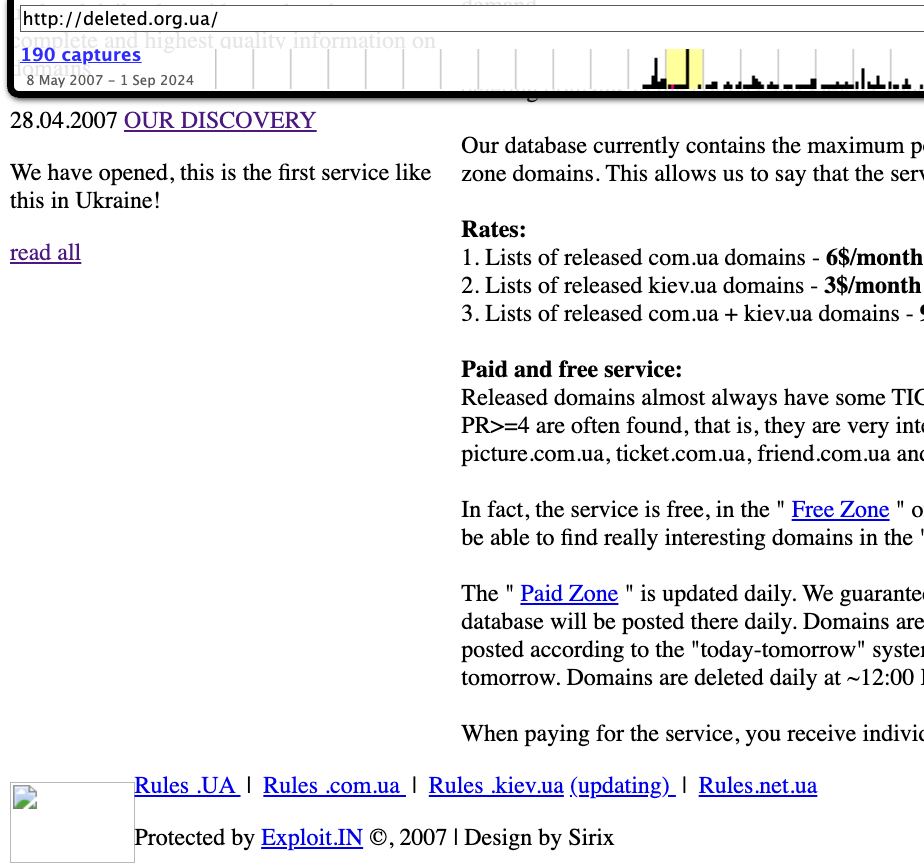
A 2008 snapshot of a domain registered to toschka2003@yandex.ru and to Anton Medvedovsky in Kiev. Note the message at the bottom left, “Protected by Exploit,in.” Image: archive.org.
Nearly all of the domains registered to toschka2003@yandex.ru contain the name Anton Medvedovskiy in the registration records, except for the aforementioned ixyq[.]com, which is registered to the name Yuriy Avdeev in Moscow.
This Avdeev surname came up in a lengthy conversation with Lockbitsupp, the leader of the rapacious and destructive ransomware affiliate group Lockbit. The conversation took place in February 2024, when Lockbitsupp asked for help identifying Toha’s real-life identity.
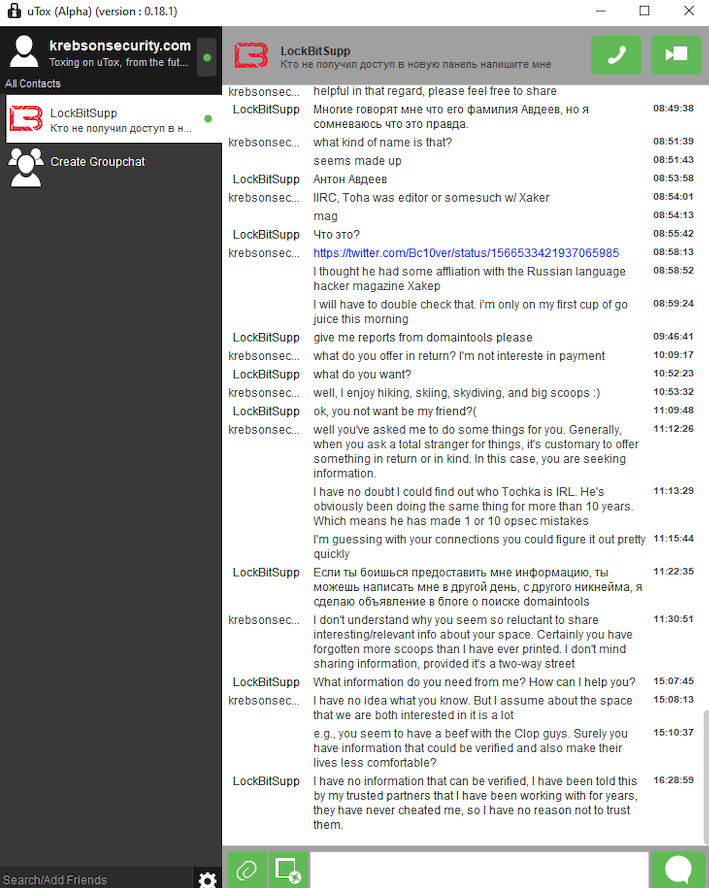
In early 2024, the leader of the Lockbit ransomware group — Lockbitsupp — asked for help investigating the identity of the XSS administrator Toha, which he claimed was a Russian man named Anton Avdeev.
Lockbitsupp didn’t share why he wanted Toha’s details, but he maintained that Toha’s real name was Anton Avdeev. I declined to help Lockbitsupp in whatever revenge he was planning on Toha, but his question made me curious to look deeper.
It appears Lockbitsupp’s query was based on a now-deleted Twitter post from 2022, when a user by the name “3xp0rt” asserted that Toha was a Russian man named Anton Viktorovich Avdeev, born October 27, 1983.
Searching the web for Toha’s email address toschka2003@yandex.ru reveals a 2010 sales thread on the forum bmwclub.ru where a user named Honeypo was selling a 2007 BMW X5. The ad listed the contact person as Anton Avdeev and gave the contact phone number 9588693.
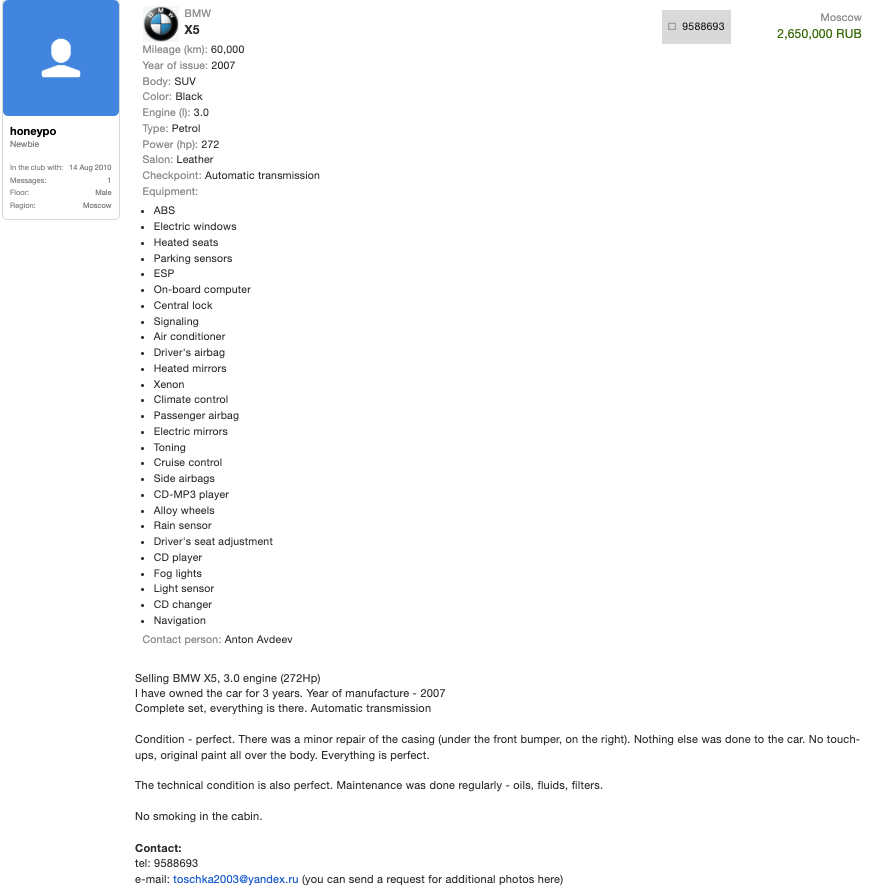
A search on the phone number 9588693 in the breach tracking service Constella Intelligence finds plenty of official Russian government records with this number, date of birth and the name Anton Viktorovich Avdeev. For example, hacked Russian government records show this person has a Russian tax ID and SIN (Social Security number), and that they were flagged for traffic violations on several occasions by Moscow police; in 2004, 2006, 2009, and 2014.
Astute readers may have noticed by now that the ages of Mr. Avdeev (41) and the XSS admin arrested this month (38) are a bit off. This would seem to suggest that the person arrested is someone other than Mr. Avdeev, who did not respond to requests for comment.
For further insight on this question, KrebsOnSecurity sought comments from Sergeii Vovnenko, a former cybercriminal from Ukraine who now works at the security startup paranoidlab.com. I reached out to Vovnenko because for several years beginning around 2010 he was the owner and operator of thesecure[.]biz, an encrypted “Jabber” instant messaging server that Europol said was operated by the suspect arrested in Kiev. Thesecure[.]biz grew quite popular among many of the top Russian-speaking cybercriminals because it scrupulously kept few records of its users’ activity, and its administrator was always a trusted member of the community.
The reason I know this historic tidbit is that in 2013, Vovnenko — using the hacker nicknames “Fly,” and “Flycracker” — hatched a plan to have a gram of heroin purchased off of the Silk Road darknet market and shipped to our home in Northern Virginia. The scheme was to spoof a call from one of our neighbors to the local police, saying this guy Krebs down the street was a druggie who was having narcotics delivered to his home.
I happened to be lurking on Flycracker’s private cybercrime forum when his heroin-framing plan was carried out, and called the police myself before the smack eventually arrived in the U.S. Mail. Vovnenko was later arrested for unrelated cybercrime activities, extradited to the United States, convicted, and deported after a 16-month stay in the U.S. prison system [on several occasions, he has expressed heartfelt apologies for the incident, and we have since buried the hatchet].
Vovnenko said he purchased a device for cloning credit cards from Toha in 2009, and that Toha shipped the item from Russia. Vovnenko explained that he (Flycracker) was the owner and operator of thesecure[.]biz from 2010 until his arrest in 2014.
Vovnenko believes thesecure[.]biz was stolen while he was in jail, either by Toha and/or an XSS administrator who went by the nicknames N0klos and Sonic.
“When I was in jail, [the] admin of xss.is stole that domain, or probably N0klos bought XSS from Toha or vice versa,” Vovnenko said of the Jabber domain. “Nobody from [the forums] spoke with me after my jailtime, so I can only guess what really happened.”
N0klos was the owner and administrator of an early Russian-language cybercrime forum known as Darklife[.]ws. However, N0kl0s also appears to be a lifelong Russian resident, and in any case seems to have vanished from Russian cybercrime forums several years ago.
Asked whether he believes Toha was the XSS administrator who was arrested this month in Ukraine, Vovnenko maintained that Toha is Russian, and that “the French cops took the wrong guy.”
So who did the Ukrainian police arrest in response to the investigation by the French authorities? It seems plausible that the BMW ad invoking Toha’s email address and the name and phone number of a Russian citizen was simply misdirection on Toha’s part — intended to confuse and throw off investigators. Perhaps this even explains the Avdeev surname surfacing in the registration records from one of Toha’s domains.
But sometimes the simplest answer is the correct one. “Toha” is a common Slavic nickname for someone with the first name “Anton,” and that matches the name in the registration records for more than a dozen domains tied to Toha’s toschka2003@yandex.ru email address: Anton Medvedovskiy.
Constella Intelligence finds there is an Anton Gannadievich Medvedovskiy living in Kiev who will be 38 years old in December. This individual owns the email address itsmail@i.ua, as well an an Airbnb account featuring a profile photo of a man with roughly the same hairline as the suspect in the blurred photos released by the Ukrainian police. Mr. Medvedovskiy did not respond to a request for comment.
My take on the takedown is that the Ukrainian authorities likely arrested Medvedovskiy. Toha shared on DaMaGeLab in 2005 that he had recently finished the 11th grade and was studying at a university — a time when Mevedovskiy would have been around 18 years old. On Dec. 11, 2006, fellow Exploit members wished Toha a happy birthday. Records exposed in a 2022 hack at the Ukrainian public services portal diia.gov.ua show that Mr. Medvedovskiy’s birthday is Dec. 11, 1987.
The law enforcement action and resulting confusion about the identity of the detained has thrown the Russian cybercrime forum scene into disarray in recent weeks, with lengthy and heated arguments about XSS’s future spooling out across the forums.
XSS relaunched on a new Tor address shortly after the authorities plastered their seizure notice on the forum’s homepage, but all of the trusted moderators from the old forum were dismissed without explanation. Existing members saw their forum account balances drop to zero, and were asked to plunk down a deposit to register at the new forum. The new XSS “admin” said they were in contact with the previous owners and that the changes were to help rebuild security and trust within the community.
However, the new admin’s assurances appear to have done little to assuage the worst fears of the forum’s erstwhile members, most of whom seem to be keeping their distance from the relaunched site for now.
Indeed, if there is one common understanding amid all of these discussions about the seizure of XSS, it is that Ukrainian and French authorities now have several years worth of private messages between XSS forum users, as well as contact rosters and other user data linked to the seized Jabber server.
“The myth of the ‘trusted person’ is shattered,” the user “GordonBellford” cautioned on Aug. 3 in an Exploit forum thread about the XSS admin arrest. “The forum is run by strangers. They got everything. Two years of Jabber server logs. Full backup and forum database.”
GordonBellford continued:
And the scariest thing is: this data array is not just an archive. It is material for analysis that has ALREADY BEEN DONE . With the help of modern tools, they see everything:
Graphs of your contacts and activity.
Relationships between nicknames, emails, password hashes and Jabber ID.
Timestamps, IP addresses and digital fingerprints.
Your unique writing style, phraseology, punctuation, consistency of grammatical errors, and even typical typos that will link your accounts on different platforms.They are not looking for a needle in a haystack. They simply sifted the haystack through the AI sieve and got ready-made dossiers.
The FBI’s takedown of the LockBit ransomware group last week came as LockBit was preparing to release sensitive data stolen from government computer systems in Fulton County, Ga. But LockBit is now regrouping, and the gang says it will publish the stolen Fulton County data on March 2 unless paid a ransom. LockBit claims the cache includes documents tied to the county’s ongoing criminal prosecution of former President Trump, but court watchers say teaser documents published by the crime gang suggest a total leak of the Fulton County data could put lives at risk and jeopardize a number of other criminal trials.
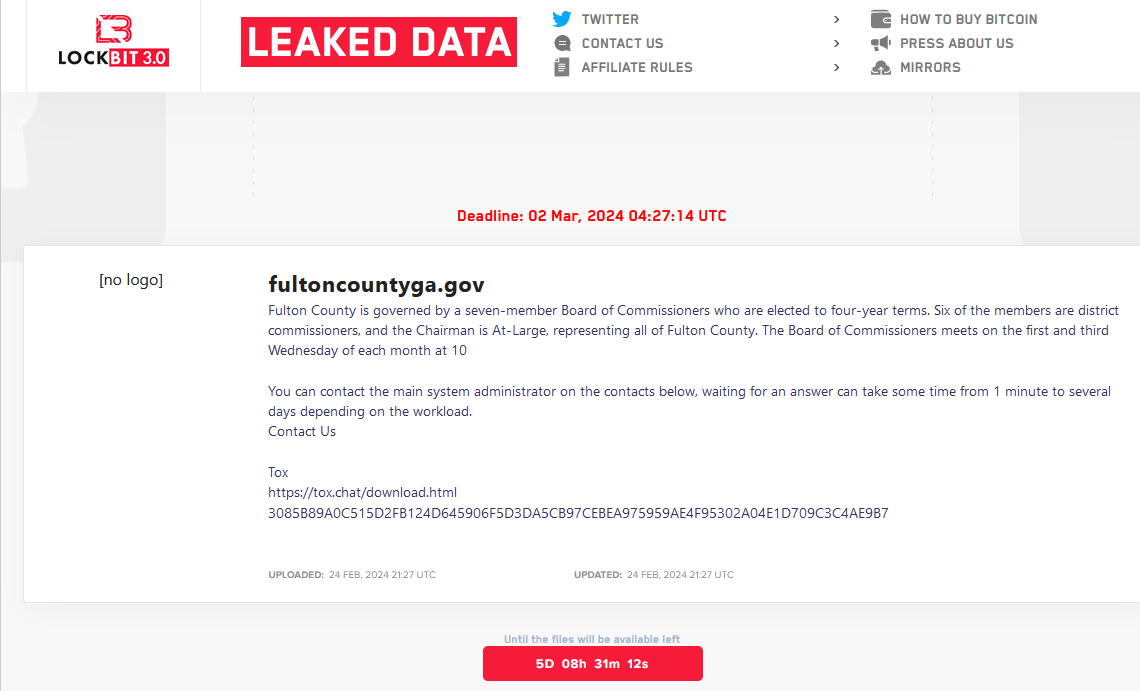
A new LockBit website listing a countdown timer until the promised release of data stolen from Fulton County, Ga.
In early February, Fulton County leaders acknowledged they were responding to an intrusion that caused disruptions for its phone, email and billing systems, as well as a range of county services, including court systems.
On Feb. 13, the LockBit ransomware group posted on its victim shaming blog a new entry for Fulton County, featuring a countdown timer saying the group would publish the data on Feb. 16 unless county leaders agreed to negotiate a ransom.
“We will demonstrate how local structures negligently handled information protection,” LockBit warned. “We will reveal lists of individuals responsible for confidentiality. Documents marked as confidential will be made publicly available. We will show documents related to access to the state citizens’ personal data. We aim to give maximum publicity to this situation; the documents will be of interest to many. Conscientious residents will bring order.”
Yet on Feb. 16, the entry for Fulton County was removed from LockBit’s site without explanation. This usually only happens after the victim in question agrees to pay a ransom demand and/or enters into negotiations with their extortionists.
However, Fulton County Commission Chairman Robb Pitts said the board decided it “could not in good conscience use Fulton County taxpayer funds to make a payment.”
“We did not pay nor did anyone pay on our behalf,” Pitts said at an incident briefing on Feb. 20.
Just hours before that press conference, LockBit’s various websites were seized by the FBI and the U.K.’s National Crime Agency (NCA), which replaced the ransomware group’s homepage with a seizure notice and used the existing design of LockBit’s victim shaming blog to publish press releases about the law enforcement action.
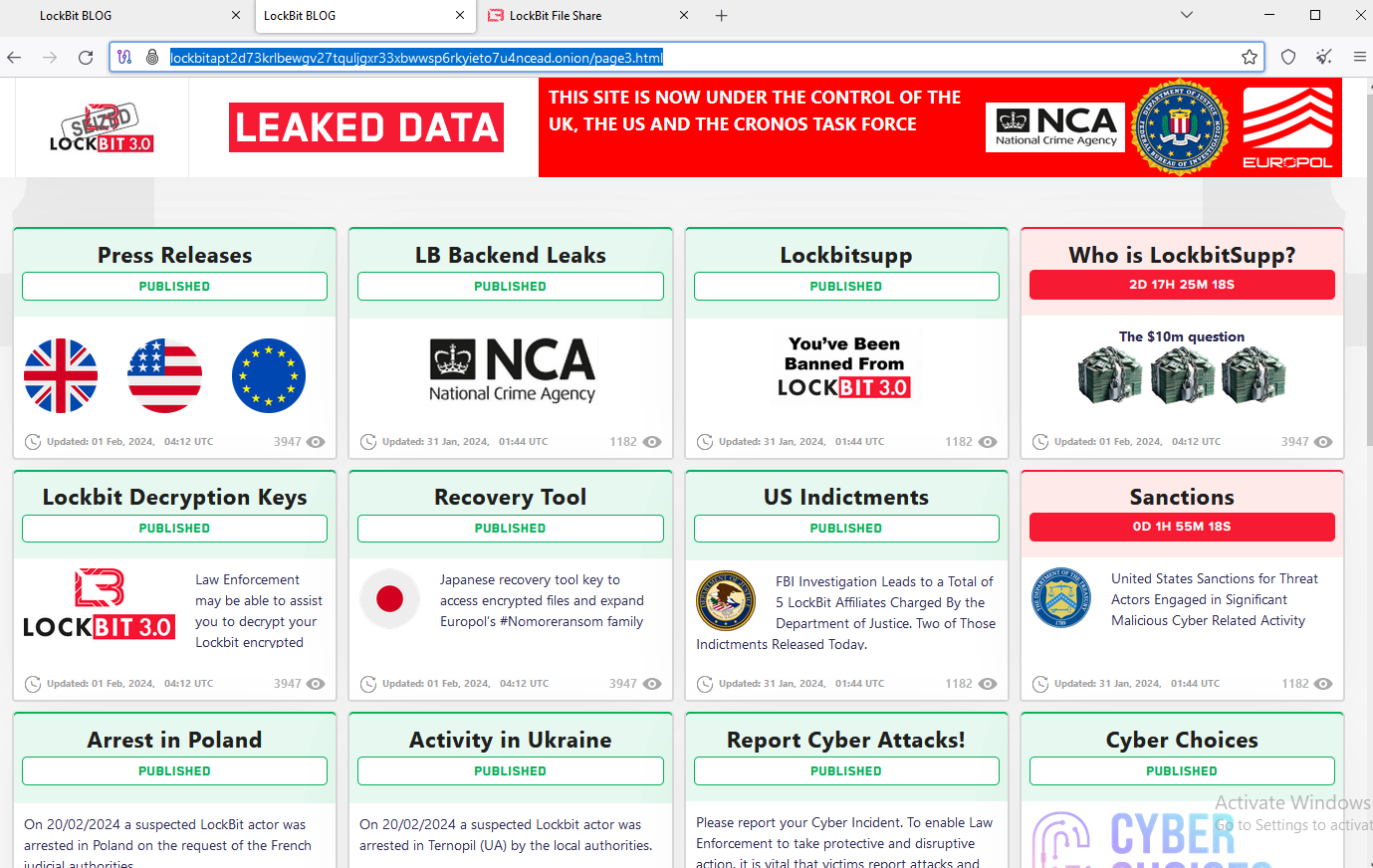
The feds used the existing design on LockBit’s victim shaming website to feature press releases and free decryption tools.
Dubbed “Operation Cronos,” the effort involved the seizure of nearly three-dozen servers; the arrest of two alleged LockBit members; the release of a free LockBit decryption tool; and the freezing of more than 200 cryptocurrency accounts thought to be tied to the gang’s activities. The government says LockBit has claimed more than 2,000 victims worldwide and extorted over $120 million in payments.
In a lengthy, rambling letter published on Feb. 24 and addressed to the FBI, the ransomware group’s leader LockBitSupp announced that their victim shaming websites were once again operational on the dark web, with fresh countdown timers for Fulton County and a half-dozen other recent victims.
“The FBI decided to hack now for one reason only, because they didn’t want to leak information fultoncountyga.gov,” LockBitSupp wrote. “The stolen documents contain a lot of interesting things and Donald Trump’s court cases that could affect the upcoming US election.”
LockBit has already released roughly two dozen files allegedly stolen from Fulton County government systems, although none of them involve Mr. Trump’s criminal trial. But the documents do appear to include court records that are sealed and shielded from public viewing.
George Chidi writes The Atlanta Objective, a Substack publication on crime in Georgia’s capital city. Chidi says the leaked data so far includes a sealed record related to a child abuse case, and a sealed motion in the murder trial of Juwuan Gaston demanding the state turn over confidential informant identities.
Chidi cites reports from a Fulton County employee who said the confidential material includes the identities of jurors serving on the trial of the rapper Jeffery “Young Thug” Williams, who is charged along with five other defendants in a racketeering and gang conspiracy.
“The screenshots suggest that hackers will be able to give any attorney defending a criminal case in the county a starting place to argue that evidence has been tainted or witnesses intimidated, and that the release of confidential information has compromised cases,” Chidi wrote. “Judge Ural Glanville has, I am told by staff, been working feverishly behind the scenes over the last two weeks to manage the unfolding disaster.”
LockBitSupp also denied assertions made by the U.K.’s NCA that LockBit did not delete stolen data as promised when victims agreed to pay a ransom. The accusation is an explosive one because nobody will pay a ransom if they don’t believe the ransomware group will hold up its end of the bargain.
The ransomware group leader also confirmed information first reported here last week, that federal investigators managed to hack LockBit by exploiting a known vulnerability in PHP, a scripting language that is widely used in Web development.
“Due to my personal negligence and irresponsibility I relaxed and did not update PHP in time,” LockBitSupp wrote. “As a result of which access was gained to the two main servers where this version of PHP was installed.”
LockBitSupp’s FBI letter said the group kept copies of its stolen victim data on servers that did not use PHP, and that consequently it was able to retain copies of files stolen from victims. The letter also listed links to multiple new instances of LockBit dark net websites, including the leak page listing Fulton County’s new countdown timer.
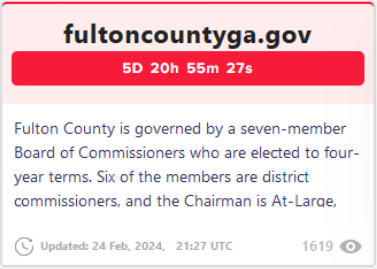
LockBit’s new data leak site promises to release stolen Fulton County data on March 2, 2024, unless paid a ransom demand.
“Even after the FBI hack, the stolen data will be published on the blog, there is no chance of destroying the stolen data without payment,” LockBitSupp wrote. “All FBI actions are aimed at destroying the reputation of my affiliate program, my demoralization, they want me to leave and quit my job, they want to scare me because they can not find and eliminate me, I can not be stopped, you can not even hope, as long as I am alive I will continue to do pentest with postpaid.”
In January 2024, LockBitSupp told XSS forum members he was disappointed the FBI hadn’t offered a reward for his doxing and/or arrest, and that in response he was placing a bounty on his own head — offering $10 million to anyone who could discover his real name.
After the NCA and FBI seized LockBit’s site, the group’s homepage was retrofitted with a blog entry titled, “Who is LockBitSupp? The $10M question.” The teaser made use of LockBit’s own countdown timer, and suggested the real identity of LockBitSupp would soon be revealed.
However, after the countdown timer expired the page was replaced with a taunting message from the feds, but it included no new information about LockBitSupp’s identity.
On Feb. 21, the U.S. Department of State announced rewards totaling up to $15 million for information leading to the arrest and/or conviction of anyone participating in LockBit ransomware attacks. The State Department said $10 million of that is for information on LockBit’s leaders, and up to $5 million is offered for information on affiliates.
In an interview with the malware-focused Twitter/X account Vx-Underground, LockBit staff asserted that authorities had arrested a couple of small-time players in their operation, and that investigators still do not know the real-life identities of the core LockBit members, or that of their leader.
“They assert the FBI / NCA UK / EUROPOL do not know their information,” Vx-Underground wrote. “They state they are willing to double the bounty of $10,000,000. They state they will place a $20,000,000 bounty of their own head if anyone can dox them.”
In the weeks leading up to the FBI/NCA takedown, LockBitSupp became embroiled in a number of high-profile personal and business disputes on the Russian cybercrime forums.
Earlier this year, someone used LockBit ransomware to infect the networks of AN-Security, a venerated 30-year-old security and technology company based in St. Petersburg, Russia. This violated the golden rule for cybercriminals based in Russia and former soviet nations that make up the Commonwealth of Independent States, which is that attacking your own citizens in those countries is the surest way to get arrested and prosecuted by local authorities.
LockBitSupp later claimed the attacker had used a publicly leaked, older version of LockBit to compromise systems at AN-Security, and said the attack was an attempt to smear their reputation by a rival ransomware group known as “Clop.” But the incident no doubt prompted closer inspection of LockBitSupp’s activities by Russian authorities.
Then in early February, the administrator of the Russian-language cybercrime forum XSS said LockBitSupp had threatened to have him killed after the ransomware group leader was banned by the community. LockBitSupp was excommunicated from XSS after he refused to pay an arbitration amount ordered by the forum administrator. That dispute related to a complaint from another forum member who said LockBitSupp recently stiffed him on his promised share of an unusually large ransomware payout.
KrebsOnSecurity sought comment from LockBitSupp at the ToX instant messenger ID listed in his letter to the FBI. LockBitSupp declined to elaborate on the unreleased documents from Fulton County, saying the files will be available for everyone to see in a few days.
LockBitSupp said his team was still negotiating with Fulton County when the FBI seized their servers, which is why the county has been granted a time extension. He also denied threatening to kill the XSS administrator.
“I have not threatened to kill the XSS administrator, he is blatantly lying, this is to cause self-pity and damage my reputation,” LockBitSupp told KrebsOnSecurity. “It is not necessary to kill him to punish him, there are more humane methods and he knows what they are.”
Asked why he was so certain the FBI doesn’t know his real-life identity, LockBitSupp was more precise.
“I’m not sure the FBI doesn’t know who I am,” he said. “I just believe they will never find me.”
It seems unlikely that the FBI’s seizure of LockBit’s infrastructure was somehow an effort to stave off the disclosure of Fulton County’s data, as LockBitSupp maintains. For one thing, Europol said the takedown was the result of a months-long infiltration of the ransomware group.
Also, in reporting on the attack’s disruption to the office of Fulton County District Attorney Fani Willis on Feb. 14, CNN reported that by then the intrusion by LockBit had persisted for nearly two and a half weeks.
Finally, if the NCA and FBI really believed that LockBit never deleted victim data, they had to assume LockBit would still have at least one copy of all their stolen data hidden somewhere safe.
Fulton County is still trying to recover systems and restore services affected by the ransomware attack. “Fulton County continues to make substantial progress in restoring its systems following the recent ransomware incident resulting in service outages,” reads the latest statement from the county on Feb. 22. “Since the start of this incident, our team has been working tirelessly to bring services back up.”
Update, Feb. 29, 3:22 p.m. ET: Just hours after this story ran, LockBit changed its countdown timer for Fulton County saying they had until the morning of Feb. 29 (today) to pay a ransonm demand. When the official deadline neared today, Fulton County’s listing was removed from LockBit’s victim shaming website. Asked about the removal of the listing, LockBit’s leader “LockBitSupp” told KrebsOnSecurity that Fulton County paid a ransom demand. County officials have scheduled a press conference on the ransomware attack at 4:15 p.m. ET today.